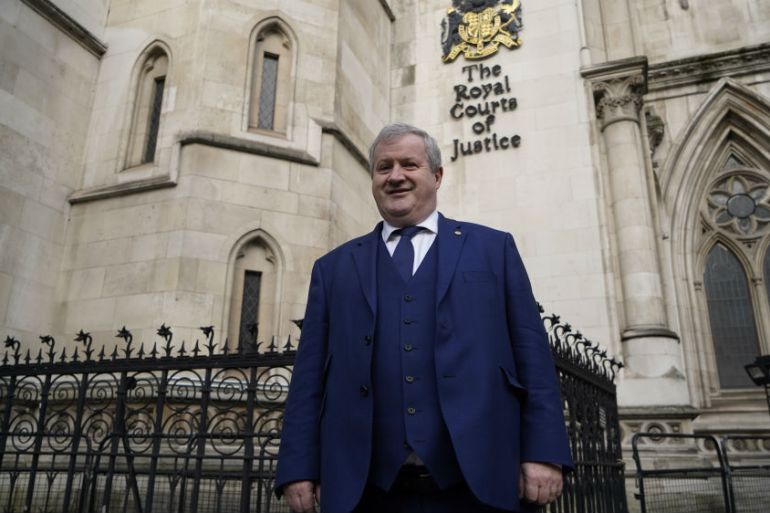UK: LibDems, SNP fail in TV election debate court bid
The third- and fourth-largest political parties in the UK’s Parliament will be excluded from Tuesday’s TV debate.

Glasgow, United Kingdom – Britain’s Liberal Democrats and the Scottish National Party (SNP) have failed in their legal bid to be included in a televised debate before the UK general election on December 12.
The ITV channel is scheduled to broadcast a debate between Conservative leader, and current prime minister, Boris Johnson, and the Labour Party’s Jeremy Corbyn, on Tuesday. But judges at the High Court in London threw out arguments made by the Lib Dems and the pro-independence SNP, which both asserted that their political convictions also required the same airtime as their rivals.
Keep reading
list of 3 itemsUK election: Ex-Conservative minister – ‘Vote Liberal Democrat’
Can a Corbyn-Sturgeon alliance save Brexit Britain from itself?
The two judges said ITV was not carrying out a “public function” in law by hosting the debate and stated there was “no arguable breach of the Broadcasting Code”.
“ITV’s decision to host a Johnson-Corbyn head-to-head fails to account for the shape of the political landscape in the UK today,” Alasdair Pinkerton, a Lib Dem parliamentary candidate, told Al Jazeera. “This is deeply retrograde and saddening. The British public deserve better. ITV is reinforcing a two-party binary that no longer exists in the UK.”
Following the 2016 UK-wide in/out European Union referendum – which saw a slender majority of Britons vote to depart the European bloc – the Lib Dems and the SNP, both unashamedly pro-EU, have looked to appeal to voters who are hostile towards the UK’s forthcoming EU withdrawal, with the SNP also looking to court Scots who back a second vote on Scottish independence.
But, despite the defeat for both parties, one political observer contended that just “bringing the case is [making] a point in itself”.
“It highlights the struggle and failure of the UK- and London-based media to understand the four nations [of Britain],” renowned Scottish political commentator Gerry Hassan told Al Jazeera. “So, it doesn’t do them any harm in bringing this and then losing.”
The 2010 game-changer
Controversy over TV debates has plagued British general elections since the first televised contest between party leaders was held in 2010. A TV debate was not even a real proposition until 1997 when an electoral clash between Conservative prime minister John Major and Labour Party leader Tony Blair appeared on the cards. But discussions broke down without agreement – and Blair went on to crush his rival by securing a landslide parliamentary majority.
Thirteen years later, however, and Gordon Brown, David Cameron and Nick Clegg, party leaders of Labour, the Conservatives and the Liberal Democrats respectively, reached a consensus to hold three head-to-head televised debates with broadcasters, ushering in a British electoral first.
The results were immediate. The first debate on April 15, 2010, recast Clegg from also-ran to apparent contender as plaudits for his performance poured in from all sides. His party’s poll ratings surged and “Cleggmania” appeared to sweep the nation.
While the general election result for the Lib Dems was a letdown, Clegg soon became deputy prime minister to David Cameron in a Conservative-Liberal coalition government that lasted until 2015.
The UK’s changing political landscape experienced a dramatic shift that year when the pro-independence SNP – the party of government at the Scottish Parliament since 2007 – swept the board in Scotland, rocketing from just six Westminster MPs to holding 56 out of 59 Scottish constituencies.
Building on support from the 45 percent of Scots who voted for statehood in the 2014 Scottish independence referendum, the SNP surpassed the Liberal Democrats to become the third-largest party at Westminster – a position where, despite losing seats in the 2017 general election, the party remains.
Yet, today, both the Lib Dems and the SNP will have to content themselves with debates that will include their party leaders, Jo Swinson and Nicola Sturgeon respectively, on the BBC alone.
But while Tuesday’s head-to-head debate will see Johnson and Corbyn square-off in a political duel that will draw in millions of viewers, Pinkerton, who is fighting for an English constituency, remains unamused.
“While this may provide the kind of masculine aesthetic and straightforwardly confrontational format that excites a broadcaster, I’m not convinced the public will find the occasion quite so appealing,” he said.